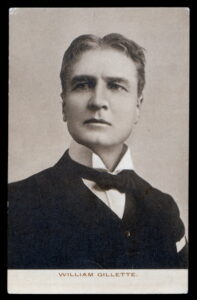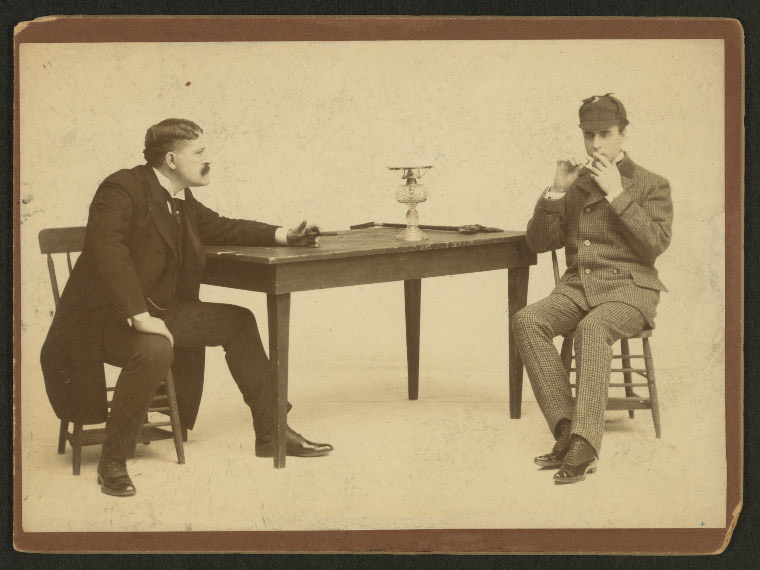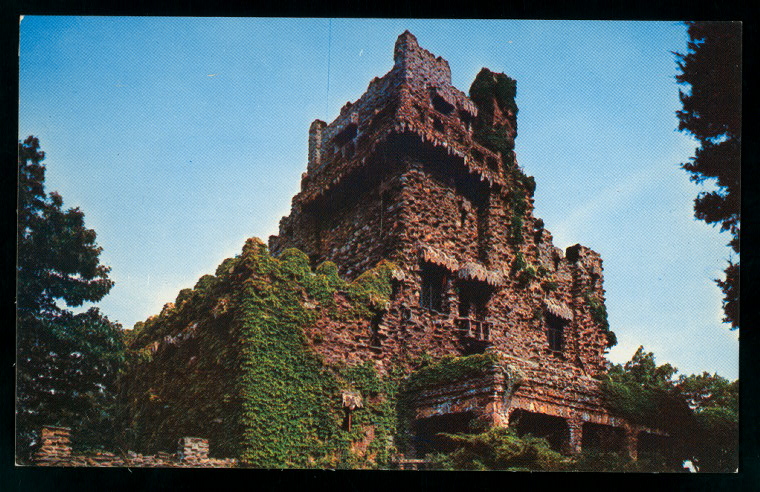 William Hooker Gillette (July 24 1853 – April 29 1937) was a Connecticut-born actor, playwright, and director, who convinced author Arthur Conan Doyle to let him adapt his Sherlock Holmes character to the stage in 1899. Gillette was the first actor to officially portray the detective not only onstage, but also on film.
William Hooker Gillette (July 24 1853 – April 29 1937) was a Connecticut-born actor, playwright, and director, who convinced author Arthur Conan Doyle to let him adapt his Sherlock Holmes character to the stage in 1899. Gillette was the first actor to officially portray the detective not only onstage, but also on film.
Gillette was named an Honorary Life Member of The Lambs in 1895. When he launched Holmes in 1899 he gave Lambs most of the roles for many years.
Gillette was born in 1853 in Hartford, Connecticut. His father, Francis, was a Yale-educated lawyer, farmer and prominent politician who served a term in the U.S. Senate. His mother, Elisabeth, was a descendant of Thomas Hooker, the founder of Connecticut. Will grew up in the Nook Farm neighborhood of Hartford with the likes of Harriet Beecher Stowe and Samuel Clemens (Mark Twain) as neighbors. He attended but quit at least four colleges, including Yale and Harvard. Around 1875 Will left home to pursue an acting career.
He joined a stock company in New Orleans in 1875. He made his first appearance at the Globe Theatre in Boston the same year. Moving to New York, he wrote Digbey’s Secretary (1884) and a Civil War spy story Held by the Enemy (1886) and then took the stage as playwright and leading actor. Among his successful plays were a light comedy, Esmeralda (1881), written with Frances Hodgson Burnett and Secret Service (1895), the year he joined The Lambs. It was a smash.
Gillette married Helen Nichols, an actress from Detroit, in 1882. In 1888, she died from a ruptured appendix at the age of 28. Will promised her that he would never remarry. He outlived Helen by 49 years, staying single and childless for the rest of his life.
It was his early 1890s success that gave Gillette the skill and success to approach the fictional detective’s creator. It was Gillette who contacted Arthur Conan Doyle, traveling to London to meet him and convince him to authorize the play.
Holmes stories debuted in 1887; Conan Doyle killed off Holmes in print in 1893. A stage adaptation he wrote failed to get off the ground, which might explain his willingness to allow Gillette to write his own. When the American asked whether the script could see Holmes married, Conan Doyle replied: “You may marry him, murder him, or do what you like to him.”
He seemed to trust Gillette implicitly; they had hit it off as soon as they met. According to Charles Higham’s biography, Gillette alighted from a train dressed as Holmes before approaching Conan Doyle’s carriage and examining him through a magnifying glass.
“Unquestionably an author,” he announced, to Conan Doyle’s amusement.
Sherlock Holmes debuted as a four-act play on Nov. 6, 1899, at the Garrick Theatre. It was an instant hit. Lambs played key roles in the debut: the first Watson was Bruce McRae; it was produced by Charles Frohman, and the musical director, Gustav Saenger, were all members of The Lambs. The play was a classic, and would go on tour with Gillette performing the role in England and across the U.S. to wide acclaim.
Gillette originated and popularized many common features of the character: the deerstalker cap, Inverness cape, curved pipe, magnifying glass and the phrase “elementary, my dear fellow” (which later evolved into “Elementary, my dear Watson,” one of the most recognized lines in popular culture). This phrase was not in any of the Conan Doyle stories.
“I believe however that there is a fortune in the other – Sherlock Holmes,” Conan Doyle wrote in a letter dated June 18, 1899. “Gillette has made a great play out of it, and he is a great actor.”
He made only one film, the 1916 silent movie version of Sherlock Holmes. For decades the movie was presumed lost, one of the great missing links of Holmes lore. In October 2014 it was discovered at the Cinematheque Francaise, a film archive in Paris. Gillette’s 1916 silent film, though set in London, was shot in the U.S. He was closely associated with the character for the rest of his life.
In August 1914, while in London, Gillette was accused of being a spy for Imperial Germany: he had the British embassy plans in his possession. Scotland Yard was about to arrest the actor, until Conan Doyle vouched for him. In 1915 Gillette was the second actor elected to the exclusive American Academy of Arts and Letters.
He also played Sherlock Holmes on radio, twice: in 1930, The Adventure of the Speckled Band (WEAF-NBC) and five years later (age 82) in a one-hour adaptation of his play on New York’s WABC with Reginald W. Mason (also a Lamb) as Dr. Watson.
Over 33 years Gillette portrayed Sherlock Holmes on stage about 1,300 times, ranking him third place of actors who played Holmes the most, led by H. Hamilton Stewart (2,000 times) and H. A. Saintsbury (1,400 shows). In 1934 Gillette was the guest of honor at The Baker Street Irregulars dinner. At age 70 he was still riding a motorcycle. When he was 76 he revived the Holmes role and played it on tours that criss-crossed the U.S. and Canada for two years.
In 1930 it was front page news when Gillette was invited to luncheon at the White House to meet President Hoover and First Lady Lou Henry Hoover, who were fans and wanted to meet Sherlock Holmes.
Sherlock Holmes made him fantastically wealthy. In 1919 Gillette built his home along the Connecticut River in East Haddam in the style of a medieval castle, high upon the hill chain known as the Seven Sisters. There he made numerous architectural renovations to accommodate his many cats, and built a three-mile-long narrow-gauge railroad for riding around his property. The Connecticut Department of Energy & Environmental Protection now operates the property as Gillette Castle State Park.
Gillette died on April 29, 1937, at age 83. He was also the last surviving charter member of The Players. He is interred next to his wife in the Hooker family plot at Riverside Cemetery, in Farmington, Connecticut.

